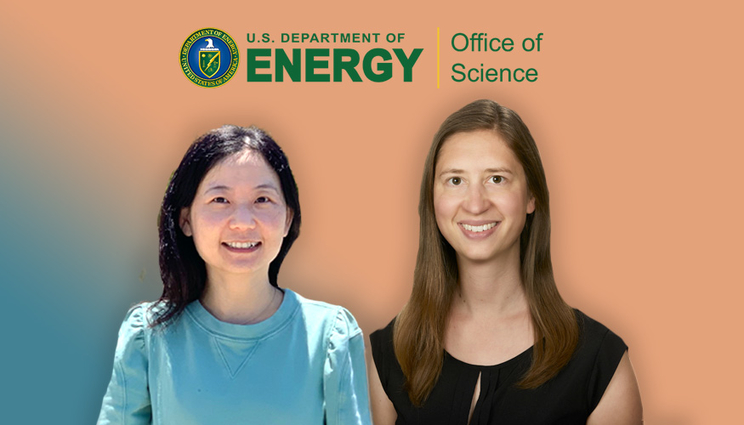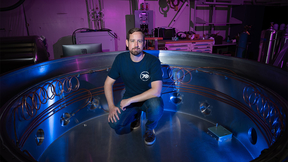DOE honors two early career Lab scientists
 (Download Image)
(Download Image)
From left: Xue Zheng, a research scientist in the Atmospheric, Earth and Energy Division in the Physical and Life Sciences Directorate at LLNL, and Andrea Schmidt, a physicist in the National Security Engineering Division in the Engineering Directorate at LLNL, have been selected to receive the 2021 Department of Energy’s Office of Science Early Career Research Program award.
Two scientists from Lawrence Livermore National Laboratory (LLNL) are recipients of the 2021 Department of Energy’s (DOE) Office of Science Early Career Research Program award.
Andrea Schmidt and Xue Zheng are among 83 scientists nationwide selected for the recognition. Under the program, typical awards for DOE national laboratory staff are $500,000 per year for five years.
The Early Career Research Program, now in its 12th year, is designed to bolster the nation’s scientific workforce by providing support to exceptional researchers during crucial early career years, when many scientists do their most formative work.
“Maintaining our nation’s brain trust of world-class scientists and researchers is one of DOE’s top priorities — and that means we need to give them the resources they need to succeed early on in their careers,” Secretary of Energy Jennifer M. Granholm said. “These awardees show exceptional potential to help us tackle America’s toughest challenges and secure our economic competitiveness for decades to come.”
Schmidt, a physicist, was selected for her work in high energy density physics, and Zheng, an atmospheric scientist, was selected for her research in aerosol-cloud interactions.
Andrea Schmidt
A physicist in the National Security Engineering Division in the Engineering Directorate, Schmidt was nominated in the High Energy Density Physics category for her work in magnetically driven Z-pinch plasmas. These plasmas can be used to study fundamental plasma physics and also to produce radiation of various types for different applications.
“It is an incredible honor to be chosen for this award,” Schmidt said. “It will allow me to spend more time on discovery science over the next few years, and fund activities that are very complementary to my program work.”
Schmidt joined the Lab as a postdoctoral researcher in 2011 and recently hit her 10-year mark as a staff scientist. She plans to use the DOE funding to make fundamental measurements of current flow in a dense plasma focus Z-pinch that “will help us understand and improve the device.” She intends to carry out the work alongside postdocs and other staff members.
Xue Zheng
Xue Zheng, a research scientist in the Atmospheric, Earth and Energy Division in the Physical and Life Sciences Directorate, was nominated in the Office of Biological and Environmental Research category for her work in aerosol-cloud processes in which she analyzes atmospheric observations and climate models to advance the understanding of cloud response to aerosols over ocean and land.
“I feel earnestly grateful to win the award,” Zheng said. “I’ve been inspired by previous award winners’ research in my area since I started my postdoc in the Lab. It is a tremendous honor for me to receive this award.”
Aerosol particles in the atmosphere can affect the Earth’s climate directly by scattering or absorbing radiation or indirectly by changing the properties of clouds (such as cloud particle size or cloud lifetime). This “aerosol indirect effect” on liquid-phase clouds remains highly uncertain in present and future climate scenarios. Zheng’s project uses DOE’s long-term Atmospheric Radiation Measurement (ARM) observations, complemented by satellite retrievals and numerical simulations, to study the aerosol indirect effect on liquid-phase clouds.
Zheng joined the Laboratory in 2014 as a postdoctoral researcher. Her research area focuses on cloud parameterizations in climate models with her primary interest in boundary layer cloud processes and aerosol cloud interactions. The additional funding will allow her to implement some advanced statistic techniques to better detect the aerosol-cloud interactions in DOE ARM observations and DOE Energy Exascale Earth System Model (E3SM).
To be eligible for the DOE award, a researcher must be a tenure-track assistant or associate professor at a U.S. academic institution or a full-time employee at a DOE national laboratory, who received a Ph.D. within the past 10 years. Research topics are required to fall within one of the Office of Science's six major program offices:
- Advanced Scientific Computing Research
- Basic Energy Sciences
- Biological and Environmental Research
- Fusion Energy Sciences
- High Energy Physics
- Nuclear Physics
Awardees were selected from a large pool of university and national laboratory-based applicants. Selection was based on peer review by outside scientific experts.
A list of all the recipients can be found on the Early Career Research Program web page.
Contact
 Anne M. Stark
Anne M. Stark
[email protected]
(925) 422-9799
Related Links
Early Career Research ProgramTags
Nuclear, Chem, and Isotopic S&TNuclear and Chemical Sciences
Office of Science
Engineering
Physical and Life Sciences
Science
Careers
Featured Articles







